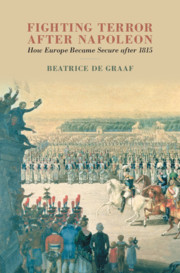(image source: CUP)
Abstract:
After twenty-six years of unprecedented revolutionary upheavals and endless fighting, the victorious powers craved stability after Napoleon's defeat in 1815. With the threat of war and revolutionary terror still looming large, the coalition launched an unprecedented experiment to re-establish European security. With over one million troops remaining in France, they established the Allied Council to mitigate the threat of war and terror and to design and consolidate a system of deterrence. The Council transformed the norm of interstate relations into the first, modern system of collective security in Europe. Drawing on the records of the Council and the correspondence of key figures such as Metternich, Castlereagh, Wellington and Alexander I, Beatrice de Graaf tells the story of Europe's transition from concluding a war to consolidating a new order. She reveals how, long before commercial interest and economic considerations on scale and productivity dictated and inspired the project of European integration, the common denominator behind this first impulse for a unification of Europe in norms and institutions was the collective fight against terror.
On the author:
Beatrice de Graaf is Distinguished Professor and holds the Chair of History of International Relations at Utrecht University. She was awarded the Stevin Prize in 2018, the highest distinction in Dutch academia. Tegen de Terreur, the Dutch version of this book, was shortlisted for the Libris Prize.
(source: CUP)

